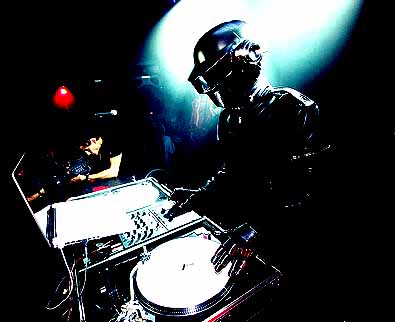3.09 

Short: Since we all have musical profiles, there should be a way to listen to universally appealing music automatically, like a lowest common denominator for every possible audience. Extending this, when we go to clubs we should upload our profiles so that the dj would mix more efficiently and the music would change with the type of people in the room.
Long:
Many of us have an ever growing musical profile attached to us via Pandora, Itunes or similar such programs. These keep track of what songs we listen to and how often. In the case of Pandora, the service actually tries to understand the musical "taste" of its users based on hundreds of criteria (repeating form, sad lyrics, solo guitar, etc.) Since most of us have these profiles, we should use them for more than our own interest i.e. "did I really listen to that song six times yesterday?"
Pandora already suggests music that it thinks you would enjoy (similar to Netflix), but much more could be done. It's amazing we aren't doing this already. For example: I'm with a friend. We hop into a car to go on a road trip. Obviously music is going to be an awkward problem on a long trip with someone who's tastes might be completely different. As a solution, instead of us taking uneven and annoying turns trying to guess what would be most palatable for each other, we simply log into BOTH of our Pandora or Itunes accounts simultaneously. These two profiles then compare notes on our listening habits and create a playlist based on the highest possible common denominator: what will make both of us most happy and the least annoyed. Though we each have unique collections, there are probably a dozen or so albums that we both happen to listen own or listen to, which would be more than enough music to last a days worth of driving. It could also determine characteristics that we both appreciate in music and try to add variety from there (like the music genome project). Obviously it won't be perfect but this will be remedied through the manual skip of bad songs (like a veto by either party). The service could also just provide a list of the most congruous thousand or so songs which we could look through and select from manually.
Expanding this model the same process would work with three, four or more people. For house parties instead of someone manually making all the decisions, everyone would log into their accounts when they arrive, thus changing the mix as different crowds come and go. This could even work in a club. Hundreds of people could contribute their musical desires automatically creating a scene that would change as often as the people within it.
"...man's relationship to his environment has changed. As a result of cybernetic efficiency, he finds himself becoming more and more predominantly a Controller and less an Effecter"
-Roy Ascott, 1964

The DJ then becomes an interpreter of this massive amount of information. He might see that many people present have recently started listening to a certain popular song. Because he knows that they'll enjoy dancing to their new found titillation, he mixes the song's chorus a number of times throughout the night, combining it with other songs thus creating a remediated version of something he can be sure people like. His melodic insertions also become an interesting form of communication. Suppose someone with uncommon preferences is in the building- we'll call him Fred. Our DJ sees that Fred mostly listens to obscure jazz from the 60's and 70's and that he has listened to Archie Shepp's Attica Blues album nearly 10 times in the past week. Our DJ also likes this obscure subsection of the musical world, which is why he noticed Fred in the first place (this collection of profiles shows him the most congruous/unique individuals in the crowd). Because Fred had obviously taken a recent liking to this record, our DJ takes quick listen. It's good. The first track is a type of funk tune that features a great drum intro. He quickly cuts this intro, loops it and mixes it in as a background to an acapella recording of a pop track. Of course Fred would be delighted and, as a way of saying "thanks for turning me on to some good music", our DJ even sends Fred the recorded mix with his loop in it as a type of memento and personal leitmotive. The next time Fred comes out and logs in, his profile will be tagged with this recording that the next DJ will be free to include or exclude at his discretion.
More than a simplistic improvement in song selection, this tool would show what people had listened to, how many times, and how recently. Therefore, to the trained interpreter it would reveal the actual mental state of the individuals and the crowd itself. He actually sees what is fresh in people's minds and therefore ripe for manipulation and artistic communication. This all plays into a mental commodification of attention and relevancy. Things that are more pervasive in people's recent memory carry more sway and could theoretically affect on an unprecedented scale. A club's atmosphere would also change in real time with the feeling of its patrons.

No comments:
Post a Comment